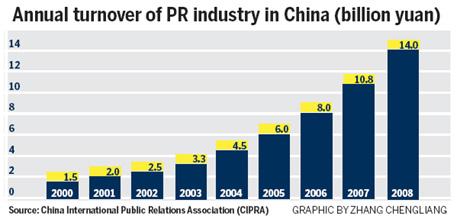Blue Focus, first in its sector to go public, aims to stave off foreign competitors
Blue Focus Communication Group LLC, a Beijing-based public relations company, got a promotional boost of its own when it was listed on the second board on Feb 27.
That glow is also being cast on other Chinese PR companies as investors and financial experts put their own spin on prospects for the sector.

According to the disclosure issued with its initial public offering (IPO), Blue Focus posted 330 million yuan in revenue and a profit of 44 million yuan in 2008. The company's shares closed Thursday at 48.62 yuan, up from the initial offering price of 33.86 yuan.
Its major client, Lenovo Group, contributed as much as 22.54 percent of that revenue. About 50 Blue Focus employees, roughly one-tenth of the company's total, are dedicated solely to Lenovo.
That worries some financial experts.
"The company relies too much on major clients like Lenovo," Luo Zhou, executive editor of Money Weekly, wrote in his magazine. "It is a potential threat for them; if big clients turn to other PR companies, the major revenue stream will immediately disappear."
Many investors lack Luo's professional knowledge.
They are simply confused about why a PR company would be listed on the Growth Enterprise Market (GEM) of the Shenzhen Stock Exchange, also known as the second board. It typically trades the stock of hi-tech companies.
Tian Wenkai, board secretary of Blue Focus, explained that PR companies are actually qualified for the second board because they offer a "new service", another category of the second board, according to the China Securities Regulatory Commission.
"There are at least 1,000 PR companies in Beijing, which means this market needs integration," Tian said.
"Now the multinationals are trying to grab China's market, so we need to build a strong brand to compete with them."
To Tian, the IPO was a good way for PR companies to obtain capital which can then be used to attract top employees and expand business.
However, some experts warned that more money and the resulting expansion might actually hurt the business.
"Since human resources are essential to PR companies, the frequent float of talented people within this field can lead to drastic results," said Wang Rui, an analyst with Guotai Junan Securities Co. "If they fail to keep their professionals during the expansion, they will lose their credibility."
Liu Huafang, an Internet investment consultant, said that the transparency following a listing can also become a problem for PR companies, "because the listing requires more information disclosure from the company, which may reduce the negotiating capability with their clients."
For PR companies, a partnership is a more common form than listed company.
"But this may not be a big problem for big companies such as Blue Focus, though," Wang said. "Its clients are big companies, which allows them to operate in a more transparent way."
Tian agreed and said the company - which was founded in 1996 by six partners - has already drafted a three-year strategy. The company calls its plan "three plus one".
"The three means expansion in three directions - to more second-tier cities like Hangzhou, to more industries, and to more services including market investigation and brand building," Tian said.
Currently, Blue Focus has 26 offices in China, mostly in provincial capitals. Traditionally, the clients of PR companies in China were limited to the information technology companies. That has resulted in PR companies lagging behind their foreign counterparts, which serve clients in a vast range of businesses.
"The one means acquisition," Tian said. "We are trying to make the full use of existing talent in companies we acquired instead of building a brand new team there."
"Anyway, listing is just one form of PR companies; the management and operations abilities count more than the form" of incorporation, Guo Huimin, deputy secretary-general of the China International Public Relations Association, said in an interview with Chinapr website.
"Besides, listed PR companies such as Blue Focus can easily get capital after they go public," Guo said. "But how to use the capital to build a solid team is what they need to think about."





